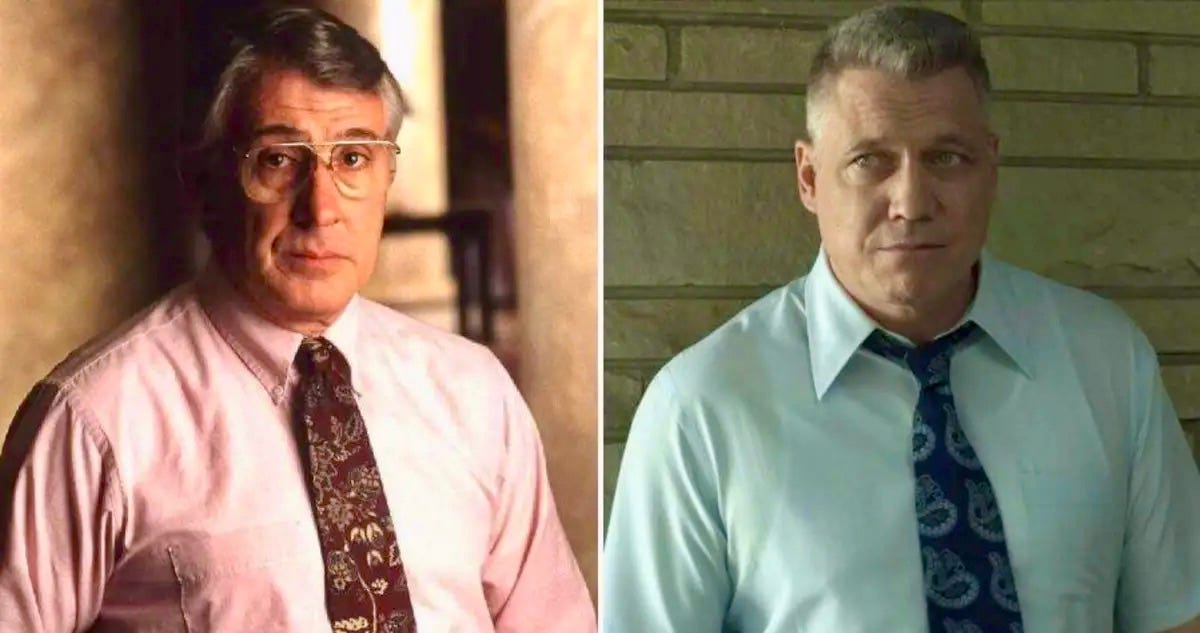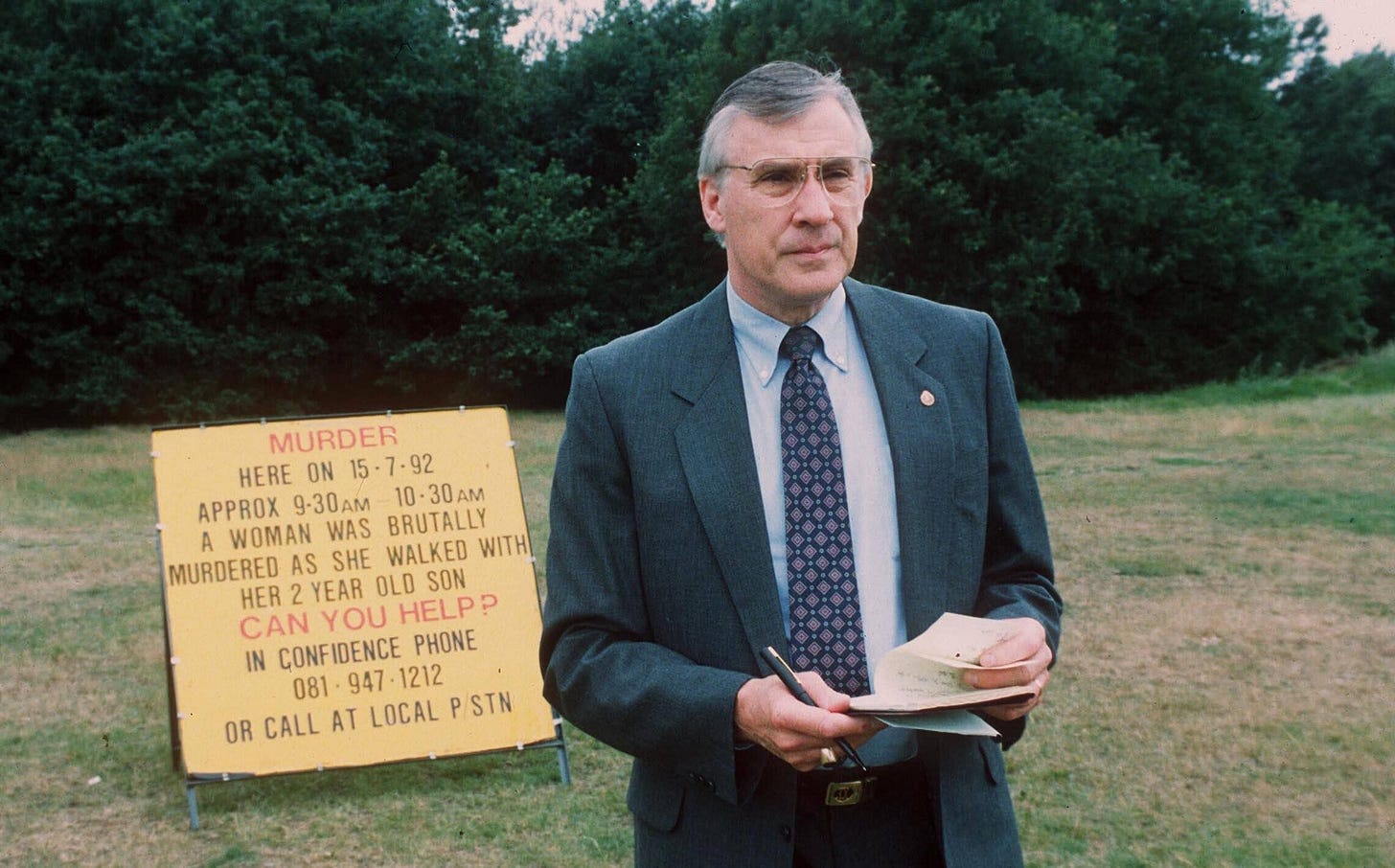Profile of a Profiler
FBI legend Robert Ressler on devising the science of criminal profiling, spending quality time with serial killers and inspiring Hollywood in the process.
A decade before his death, aged 76, in 2013, legendary FBI profiler Robert Ressler took a break from catching criminals to chat with me about his remarkable career and unexpected impact on Hollywood. Here I present my original, unedited interview.
Robert Ressler knows a thing or two about evil. As founder and former director of the FBI’s celebrated Violent Criminal Apprehension Program, he has devoted his life to identifying, profiling and apprehending the most notorious serial killers of our time. It’s because of Ressler that we’re able to catch them now. Before him we didn’t even know they existed. He’s made the world a safer place, and Hollywood that much more exciting, having inspired Thomas Harris’s FBI thrillers Red Dragon and Silence of the Lambs, as well as Chris Carter’s TV spookfest The X-Files (1993-2018).
Ressler’s story begins in 1946 when, at the tender age of nine, he became obsessed with a string of killings in his native Chicago. “William Heirens was a student involved in a series of break-ins, robberies and murders,” he explains.
“Every day I’d scour the papers for news about the Lipstick Killer, as he was known at the time. At first Heirens only killed adult women, but then there was this six-year-old girl whose body had been dismembered and her body parts placed in the sewers around her neighbourhood.
"I became so fascinated with the story that eventually it entered my play world. I formed a detective agency with several friends, handed out assignments, and set out to crack the case. We conducted surveillances throughout the neighbourhood and investigations as best as we could imagine.”
They were just playing though… right? “There was a certain amount of fantasy and a certain amount of reality involved. I don’t think we really believed we were going to catch him, but it was the perfect summer play game.
"Of course, when Heirens was finally caught we were convinced that we’d played some part in it. Years later I found myself sitting before him in a prison in Southern Illinois, interviewing him for my research. That was pretty strange.”
A career in criminology beckoned, and Ressler responded to the call. “I was on the road to a career that didn’t yet exist. There was no such thing as criminal profiling when I started out, so along with a lot of other very talented people, I had to invent it. I studied criminology at Michigan State university, joined the army’s criminal investigation division, and then the FBI’s Behavioral Science Unit. That was in 1970.
"I was then free to pursue the idea of a criminal personality profiling programme, which eventually expanded into the National Centre for the Analysis of Violent Crime, and then the Violent Criminal Apprehension Programme, which I started. None of this existed before I joined the Bureau. The FBI didn’t teach me those skills. I brought them myself to the FBI.”
Creating the science of criminal profiling, the art of understanding a killer in order to catch him, was no easy task, and not everyone at the FBI understood what Ressler and his colleagues were up to.
“There was some reluctance from the FBI to accept a lot of the things we were doing because they were so non-traditional. One very senior FBI person in Washington DC cautioned me. He said, ‘Ressler, it seems to me you have the basic talents of a social worker, that you want to talk to criminals after they’ve been arrested and help them. But if you want to be a social worker, I suggest you get out of the FBI and do that instead.’ I looked him in the eye and told him I wanted to combine my interests for the long term good of the FBI, and that, I’m pleased to say, is exactly what happened.”
It was Ressler who coined the term serial killer, with a little help, it turns out, from Scotland Yard. “The term arose from the fact that there was a great deal of confusion in the media about how to describe multiple and sequential homicides. Everything was being referred to as mass murder. By the late-Seventies I was working on a Crime Classification Manual that aimed to create terms specific to different types of crime, serial murder being one of them. I have to admit that I borrowed the term from the British police, who at the time used the phrase series crime to describe a string of burglaries. I didn’t want to steal the term outright, so I used serial instead.”
Although serial killers have obviously been around for centuries, we’ve only been aware of them for the past thirty-odd years. “I credit this largely to the news and entertainment media,” says Ressler.
“Back in the Forties while the Heirens case was going on, we were pretty much dependent on the radio. The story only got local coverage in the press, but today it would be big international news. Today, thanks to advances in communication and education, people are much better informed.”
People are more savvy now, but isn’t there a downside to that? Isn’t it possible for the bad guys to read Ressler’s books and use them to outsmart him and his kind? “It’s somewhat possible, but keep in mind the personalities of these people. Even if they’re intelligent, they’re extremely dysfunctional and strongly impulse driven, so I have yet to see any of them pull off a so-called perfect crime. Really it’s best to share information. The benefits far outweigh the liabilities.”
If movies have taught us anything it’s that criminal profilers live a life of constant peril. Is that true? Ressler shakes his head. “To be honest, it’s much more analytical. The media invented this idea that serial killers are always turning on their profilers, but it’s simply not the case. First of all, serial killers are cowards, unlikely to target anyone who could adequately defend themselves. Secondly, serial killers and the people who profile them usually live hundreds of miles apart, in different States, so it’s unlikely they’d ever come in contact.”
Despite the lack of life-or-death struggles, Ressler’s life has not been entirely danger-free. Over the years he has interviewed more than a hundred serial killers for his work, John Wayne Gacy and Jeffrey Dahmer among them. “I’ve learned quite a bit,” he says.
Though for the most part the interviews took place in safe, controlled environments, there was this one time that Ressler had to think fast and talk even faster to avoid a gruesome fate.
“Edmund Kemper had committed his crimes around the time I joined the FBI. I didn’t meet him until the late Seventies when he was already in prison. Considering that he was 6”9’, weighed 300lbs and had a very high IQ of 150, I thought I’d better take a couple of agents with me. Which I did, for the first interview. The second was done by myself and just one agent, while the third I did by myself, because the other guy had a commitment he couldn’t break. It was in that interview that Edmund Kemper threatened to break my neck and tear my head off.”
What exactly did he say? ““He pointed out that the guard outside the cell had finished his shift and gone home, and that his relief was going to be late because he was busy feeding the inmates elsewhere. ‘That’s fine, Ed,’ I told him. “I hope you don’t miss your dinner. We can just chat here until the guard comes.’ And he said, ‘or I could break your neck like a twig, twist your head off and put it up on the table and let it greet the guard when he gets here.’”
Yikes. How did you get out of that one? “I tried to make conversation, to keep him busy. Kemper had decapitated all his victims, so I took his threats very seriously. We talked for a while about whether or not you could actually twist a person’s head off and that seemed to occupy him. I’m an experienced hostage negotiator and stalling for time is a big part of that, so I kept him distracted until, finally, the guard came and got me.”
Most of what we know about serial killers, crime detection and prevention comes from movies and TV. “They do say that art reflects life, and vice versa,” agrees Ressler. But do they ever get it right? “Hollywood has to go beyond reality to keep things interesting, but even though they’re exaggerated, films like Manhunter (1986) and The Silence of the Lambs (1991) are definitely based in reality.”

But what about The X-Files? Ressler had a hand in that too and that’s not exactly true to life. “That is a crazy show, no doubt about it. All those aliens and mutants. I do like it though. Chris Carter had read some of my work and devised the plot of his show around the fact that Fox Mulder was a behavioral science agent who had spun off and created the X-Files. Let me make it quite clear though,” stresses Ressler, “there is no such thing as the X-Files. Don’t ask me if I’ve ever tangled with an ET.”
Ressler has seen his fair share of creepy stuff, though. Turns out there’s even some truth in The X-Files. “I’ve had vampire cases, cannibal cases, cases involving the occult and Satanism... Some of it got fairly spooky, but at the same time there was always a rational explanation.”
The flat-out scariest serial killer he ever encountered, recalls Ressler with a shiver, was “The Vampire Killer of Sacramento, California. Richard Trenton Chase was his name. He was a modern day vampire, drinking blood, killing for blood. He came from a different plane of reality, almost like he was straight from Hell, and his appearance and demeanour really unnerved me.”
For forty years now Ressler’s been working to keep us safe from the psychos among us. Surely he must be paranoid as hell by now? “Although I don’t dwell on my work it’s always in the back of my mind. From time to time I come across people who I recognise are not what they appear to be, or are very suspicious. There’s a sensitivity there that you can’t turn off, but that doesn’t mean I suspect everyone I meet.”
Surely his work takes its toll, though? “I’ve tried to maintain a reasonable balance in my life, between my family and my work,” sums up Ressler, “and I think I’ve done that. I’ve not bent under the pressure yet!”
Can you imagine a higher stress profession than criminal profiling? How do you think you’d handle the pressure?






I loved Ressler and have read most of his books.
Fascinating. I never really believed in ‘born bad’ rather that circumstance was the majority of the cause. Then a friend told me about a serial killer (now incarcerated) they had known since they were 8. Excellent family and support but a dark mind from birth.